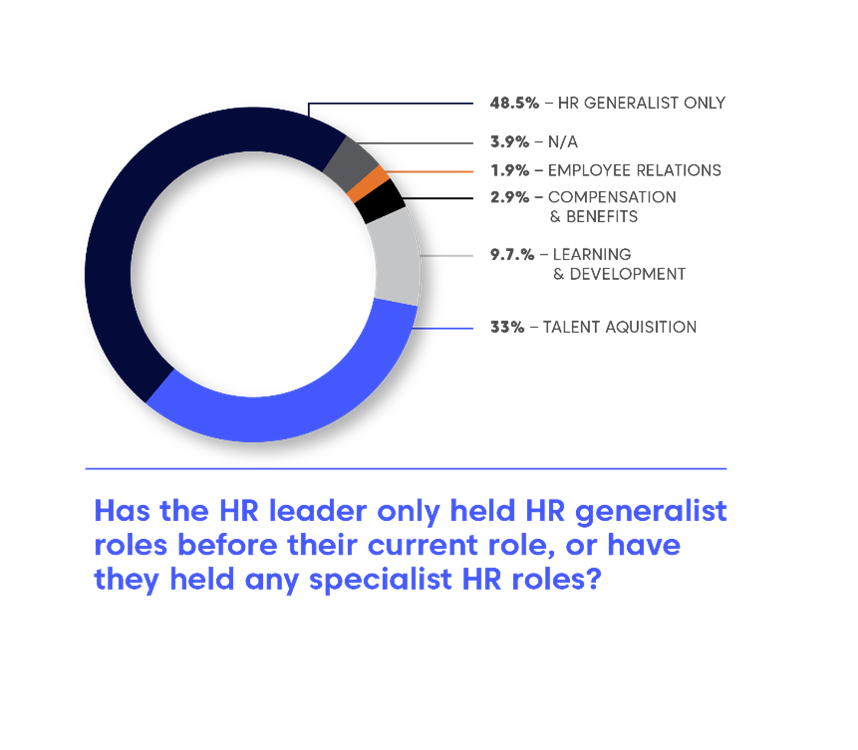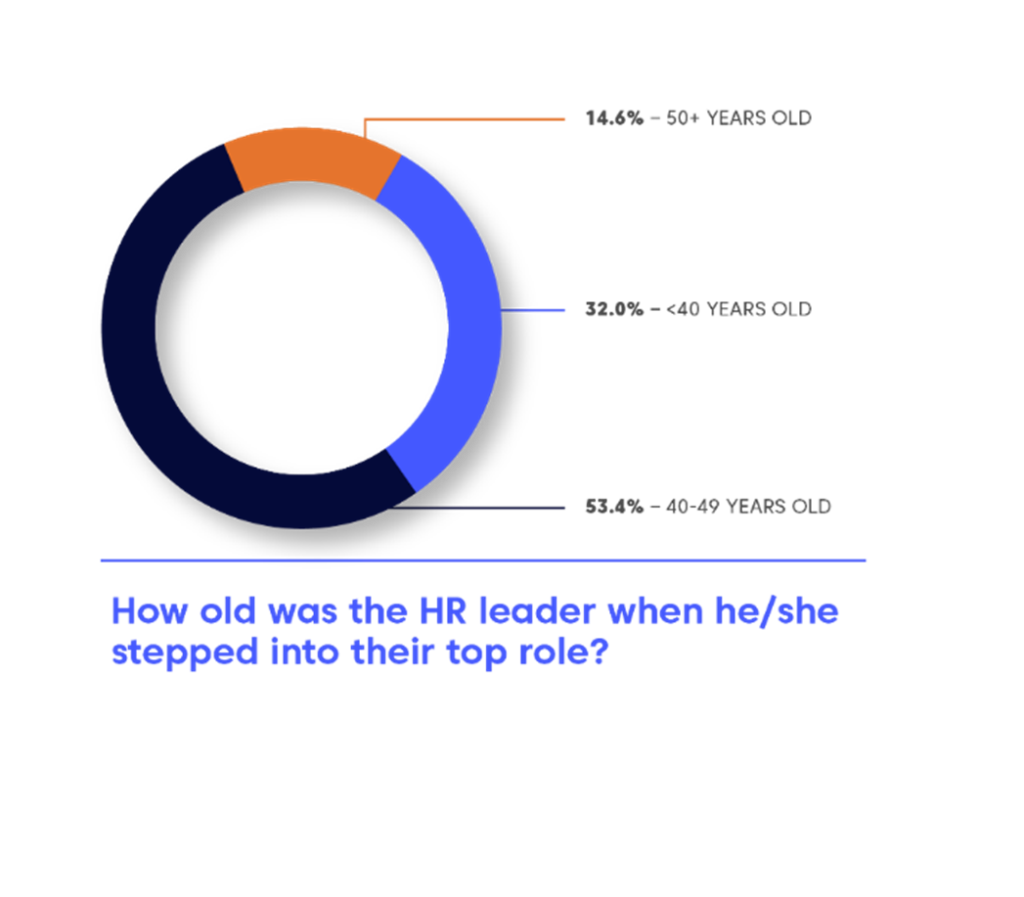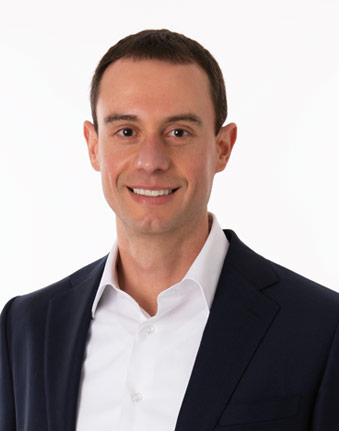To find out, we analyzed the backgrounds of more than 100 of the top HR officers of the fastest-growing B2C startups in the United States. All the companies in our study had either been identified as a unicorn (a company valued at $1 billion or more) and/or received over $100 million in funding within the last three years.
All the companies in our study are consumer-focused. They include e-commerce businesses, online marketplaces, subscription businesses, and mobile apps. They represent a variety of industries, including apparel and fashion, beauty, consumer products, food and beverage, health and wellness, personal finance, real estate, social media, sports and entertainment, and travel.
There are six key findings from our research:
- Most of the top HR officers of the fastest-growing B2C startups had previously worked for a technology company.

We found that 71.8% of the top HR officers in our study had worked for at least one technology company (enterprise software, technology services, or consumer internet) before joining their current company. Only 28.2% of these leaders had never worked for a technology company.
The next most common industries for prior experience were professional services, media and entertainment, financial services, retail and apparel, and consumer packaged goods (CPG).

2. The majority of these top people officers have spent their entire career in corporate HR and/or third-party recruiting roles.

We found that 60.2% of the top HR officers at the fastest-growing B2C startups have spent their entire career in corporate HR and/or third-party recruiting roles, while 39.8% had worked in another function. The most common kind of other functional experience was in consulting (22.3% of all the executives in our study).
3. Roughly half of the top HR officers at the fastest-growing B2C startups had prior experience in a specialist HR role.
We found that 51.5% of the top HR officers in our study had spent time in a specialist role focused on talent acquisition, learning and development, compensation and benefits, or employee relations. Nearly as many had only held HR generalist roles.
Talent acquisition is the most common HR specialist experience amongst the top HR officers at the fastest-growing consumer startups. Executives were more than three times as likely to have had a full-time talent acquisition role than a full-time role in learning and development. They were also more than ten times as likely to have had a full-time talent acquisition role than a full-time role in compensation and benefits or employee relations.
However, most of the executives in our study (67.0% of them) had never held a specialist role focused on talent acquisition.

4. Most of the top HR officers of the fastest-growing B2C startups stepped into their role after the age of 40.

We found that 68% of these top HR officers stepped into their role after the age of 40, while only 32% did so when they were younger. The median age was 43 when the top HR officer stepped into their current role. The median number of years of work experience was 21 years of experience.
5. Women occupy the majority of the Chief People Officer roles at the fastest-growing B2C startups.
Women account for 73.8% of top HR roles in our study, compared to 26.2% men. These percentages skew slightly more toward women than the gender percentages across all industries and company sizes/stages. Research by Namely (an HR software company), has found that roughly 70% of HR leaders (across all industries and company sizes/stages) are female. 1

6. Having an advanced degree is not a significant advantage in securing a CHRO role at a top B2C startup.

We found that 55.3% of the top HR officers of the fastest-growing B2C startups have an advanced degree, while 44.7% of them do not. Approximately 20% of them have an MBA, while roughly 29% of them have another kind of Master’s degree. Roughly 7% have a JD, and roughly 3% have an MD or PhD. Several individuals in our study had more than one advanced degree.
Key Takeaways
Here are some key takeaways for HR executives who aspire to become CHRO of a top B2C startup, and also for investors, Founders, and CEOs seeking to hire a CHRO.
For Aspiring CHROs:
Your most likely path to becoming CHRO of a top B2C startup is from a technology company (enterprise software, technology services, or consumer internet). Nearly 72% of the top HR officers of the fastest-growing B2C startups had worked for at least one technology company before stepping into their current role.
You would also be well-served to work in a role focused on talent acquisition at some point in your career. While we found a relatively even mix of executives who did and did not have prior experience in a specialist HR role, talent acquisition is the most common kind of specialist experience by far amongst top HR officers.
Career Advice from Top HR Executives
We asked several top HR executives for their #1 piece of career advice for individuals who aspire to one day become the Chief People Officer for a top B2C startup. Here is what they said:
“Take on stretch assignments across different HR functions. For example, if you are a recruiter, take on a rotation as an HR business partner or take on a rotation helping the total rewards function.” – Kerry Fischer, Principal at Fischer People and Culture Group and former Senior Vice President of People and Culture at Dapper Labs (the blockchain company behind NBA Top Shot)
“Get yourself into the rooms where strategy is being set and really lean into coaching the executives that you support. Those are the two things that will help you go from being seen as an ‘executor’ to being seen as a ‘peer’ on the executive team.” – Mel Steinbach, Chief People Officer at MasterClass (a streaming platform) and former Chief People Officer at Cameo (a celebrity video platform)
“Run into the fire. There is often a tendency for people to run away from a fire because they don’t want to deal with a messy situation. I would say to take a chance and run to that fire with curiosity and get it back into a better place. You will learn how to solve problems and how to work with other people, and you will develop many skills that will help you in your career.” – Maria Weaver, Former Chief People Officer at Niantic, Inc. (the world’s leading AR technology company)
Hiring Advice for Investors, Founders, and CEOs:
Before you begin a search for a CHRO, determine what the position needs to accomplish in the next one to two years to be considered a success. Be as specific as possible when establishing these goals. Doing so will help you identify and assess potential candidates. It will also help you measure performance after someone is hired.
As you evaluate potential candidates, prioritize those who have previously worked at technology companies. Our research found that over 71% of the top HR officers of the fastest-growing B2C startups had worked for at least one technology company (enterprise software, technology services, or consumer internet) before joining their current company.
In addition, prioritize candidates who have previously worked in high-growth environments. As Maria Weaver, Former Chief People Officer at Niantic, told us: “There can be a disconnect when people are coming into a high-growth startup from very large companies where they are used to a lot of infrastructure, formality, and hierarchy. They need to be able to work in a scrappy, agile environment.”
Another factor to consider as you evaluate candidates is which kind(s) of HR functional experience they have. While most of the executives in our study had never held a specialist role focused on talent acquisition, our recommendation is to prioritize individuals who have HR generalist experience and have had a full-time role focused on talent acquisition (corporate or third-party recruiting). If this is not possible, consider the advice of Mel Steinbach, Chief People Officer at MasterClass. Before joining MasterClass, Mel had held roles leading all of HR, and she had also held roles focused on talent acquisition.
“When you are in hypergrowth mode, the HR activity you are doing the most is hiring. Having someone who understands how to do that makes a lot of sense,” Mel told us.
“As you start scaling, the complexity of the people leadership role starts increasing exponentially, and someone with a generalist background can handle that well since they have done a little of everything. If I was going to advise VC firms, PE firms, Founders, or CEOs [on this], I would say to hire an HR generalist because it’s easier to find excellent support with hiring than it is to find excellent support with employee relations, learning and development, and compensation and benefits.”
“Many CEOs do not really understand the HR function. The HR function is a combination of legal, finance, product, sales, internal communications, and sometimes real estate. It is a really meaty job. Do your research and make sure you really understand what HR is. Then, have the mindset that HR is a strategic partner.” – Kerry Fischer, Principal at Fischer People and Culture Group and former Senior Vice President of People and Culture at Dapper Labs
References
- “HR is overwhelmingly white and female, data indicates,” HR Dive, February 20, 2019, https://www.hrdive.com/news/hr-is-overwhelmingly-white-and-female-dataindicates/548600/#:~:text=Seventy%2Done%20percent%20of%20HR,67%25%20of%20the%20H R%20workforce.
About the Author

Pete Leibman is a Principal at Calibre One, a leading global executive search boutique specializing in building leadership teams for innovators, entrepreneurs and companies undergoing technology or digital transformation. Pete joined Calibre One after launching an executive search and consulting firm called Stronger Talent. Before that, he worked at Heidrick & Struggles, a big five executive search firm. Pete’s career began in pro sports working for the NBA’s Washington Wizards. He was their #1 Salesperson for three years. He also created their Sports Careers Day, an event attended by over 25,000 people. Pete graduated Phi Beta Kappa from The Johns Hopkins University. You can connect with Pete on LinkedIn or by email at pete.leibman@calibreone.com.